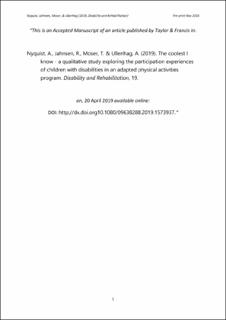| dc.description.abstract | Purpose: The first aim of the study was to obtain a broader understanding of how children 10–13 years old with disabilities experience participation in self-selected physical activities during an intensive group rehabilitation program. A second aim was to explore how new skills and experiences gained from intensive group rehabilitation can be transferred to meaningful participation in local environments. Material and methods: Individual in-depth interviews obtained the perspectives on participation of a purposive sample of eleven children with disabilities. The study applied inductive thematic coding of the content associated with participation followed by deductive analysis. Results: Five main themes were derived; “to learn and to show others new activities”, ”belonging, solidarity and friendship”, “activity and participation enjoyment“, “participation on my own terms” and “transfer to the local environment at home”. To practice and learn physical activities during intensive group rehabilitation seemed to enhance transferring of meaningful participation to the local environment, and was related to the children’s activity competence, preferences and self-efficacy. Conclusions: The rehabilitation stay created a setting where children learned diverse activities together with equal peers, which resulted in mastery, friendship and enjoyment. The children participated on their own terms, and continued to do so in their local environment. Implications for Rehabilitation A context of freedom to learn preferred adapted physical activities on children’s own terms is important for transferring meaningful participation to local environments. A high intensity rehabilitation program with enough time to try and to learn diverse adapted physical activities is essential to increased activity competence in children with disabilities. Attendance in a group of equal peers provides opportunities to experience new roles and thus strengthens the sense-of-self and creates a feeling of belonging, solidarity, friendship and joy. | en_US |
